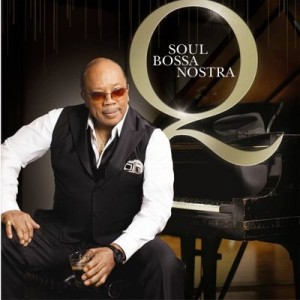 The fact that “Soul Bossa Nostra” even exists is a bit confusing to me. Like, did this album need to be made? After all-it basically amounts to a huge slap on the back for Quincy Jones. Not to say he doesn’t deserve props-the man was at the top of his game for the better part of forty years and is an integral part of music history, let alone black music history. But I question the wisdom of letting a who’s who of modern pop and soul tackle some of his best known and best loved compositions the same way I question covers albums in general. Who’s gonna improve on the originals?
The fact that “Soul Bossa Nostra” even exists is a bit confusing to me. Like, did this album need to be made? After all-it basically amounts to a huge slap on the back for Quincy Jones. Not to say he doesn’t deserve props-the man was at the top of his game for the better part of forty years and is an integral part of music history, let alone black music history. But I question the wisdom of letting a who’s who of modern pop and soul tackle some of his best known and best loved compositions the same way I question covers albums in general. Who’s gonna improve on the originals?
Suffice it to say, there are no improvements to be found on “Soul Bossa Nostra”. I will say that the album was better than I expected it to be. I will also say that all it needed to do to impress me was be halfway decent. My expectations were alarmingly low-so low that I questioned the intelligence of buying the CD the minute I walked out of the record store with it. So, the fact that the album is not totally coaster material is somewhat comforting.
My biggest beef with “Bossa Nostra” is that it sounds forced-put together not for any kind of creative reason, but to get Q back on the radio somehow. Why else would you remake a song like “Strawberry Letter 23” with Akon? Not to say the lyrics contain any deep emotion or meanings, but at least in the hands of The Brothers Johnson and Shuggie Otis (the song’s original composer and performer), the song had a cool, trippy vibe. Akon just sounds like an Auto-tuned cipher here. Same goes for whoever had the awful idea to put T-Pain on a remake of Michael Jackson’s “PYT”. While co-vocalist Robin Thicke at least tries to do his best MJ, hearing T-Pain’s robotic vocals on the song’s first verse is a complete turn off. What does it say about the evolution of music when it’s okay to replace one of modern pop music’s greatest vocalists with a computer?
Those two travesties aren’t nearly as bad as when Q takes a couple of slow jams and turns them into club joints. Jennifer Hudson does a good job with “You Put a Move on My Heart” (originally recorded by Mica Paris and popularized by Tamia), but the song’s meant to be a ballad and would’ve been much better had Hudson recorded it that way. Same goes for the remake of the 1989 classic “The Secret Garden”. One of the great seduction ballads of all time, the “Bossa Nostra” version sounds like a 2 Live Crew production, with rap vocals from LL Cool J (whose “Planet Rock” cadence isn’t fit for a love song) and singing from Tyrese, Usher and Thicke. Barry White’s vocal from the original is left in for some strange reason, and Tevin Campbell takes over for El DeBarge, ad libbing at the song’s conclusion. Why Campbell (the best vocalist in the bunch) doesn’t have a bigger role in the song is completely beyond me.
Several top-shelf artists keep “Bossa Nostra” from being a complete piece of trash. Mary J. Blige doesn’t add much to her rendition of 1981’s “Betcha Wouldn’t Hurt Me” (originally sung by Patti Austin), but the fact that she fits so easily into this song makes clear that her real musical inspirations come from late Seventies/early Eighties soul. Meanwhile, Bebe Winans does a fairly straight (and engaging) version of “Everything Must Change”, and on the rap tip, Talib Kweli murders the theme from “Ironside”. It almost makes up for the Three 6 Mafia-assisted “Hikky-Burr”.
To go back to my original point-I’m not sure why this exists, except for two reasons. One being Quincy feeling the need to take a victory lap in his twilight years, and the other being that this is the type of album that’s tailor made to win a shit-ton of Grammy Awards. As for whether “Soul Bossa Nostra” will get any lasting play in your iTunes library or CD collection, I’m gonna put my money on the answer being “no”.
Grade: C
